
My best friend, the forest
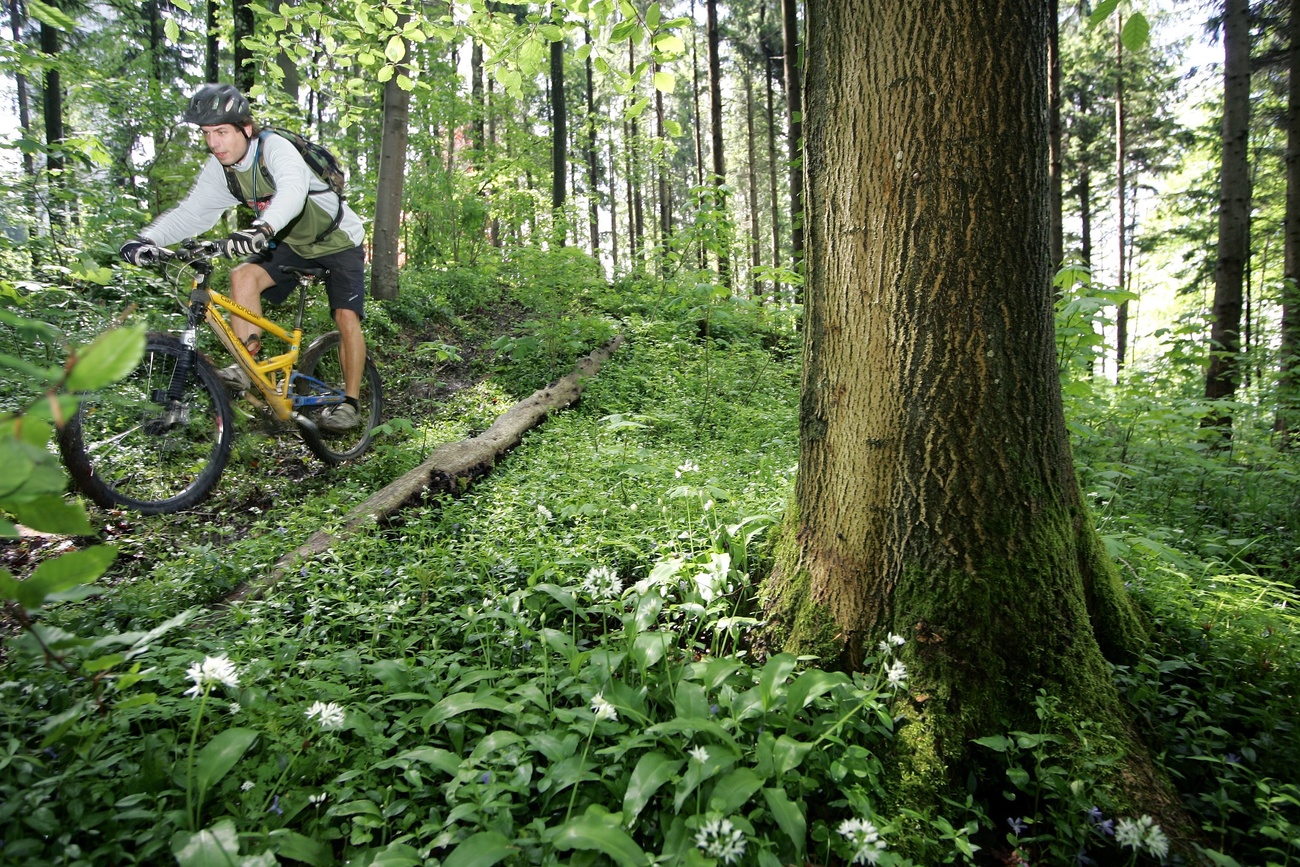
In Switzerland more of us than ever regularly head into the woods. But other people more frequently dampen our enjoyment of the experience than they used to. Our relationship with the forest has become a little complicated.
What do the Swiss typically do in their free time? Eat fondue? Go hiking? No, they venture into the forest. According to the results of a monitoring survey published in March 2022 by the Swiss Federal Institute for Forest, Snow and Landscape Research (WSL), 95% of the Swiss – almost everyone, basically – regularly visit the woods. This is the highest proportion since academics began studying Switzerland’s relationship with its forests in 1997.
However, “heading into the woods” in today’s Switzerland is no longer quite the same as it was 25 years ago, when all you had was a Vitaparcours fitness trail. Both people and forests are changing. Forests are playing an increasingly important role in our lives because they provide a natural haven from urban sprawl. Our woods have also become more vulnerable due to climate change and extreme weather – and are arguably no longer the hallowed, tranquil places they once were.
More
Tree-felling controversy
Katrin Sedlmayer, a former local politician in the Köniz suburb of Bern, was indignant. “The forest needs our help!” she wrote half a year ago at the bottom of a protest letter signed by some 400 other angry people who were demanding an end to what they saw as the unecological felling of significant swathes of the popular recreational forest on the Könizberg hill overlooking the capital.
Könizbergwald, the forest situated on the municipal boundary between Bern and Köniz, is like a green island amid the rising urban tide. In recent years a new housing development for 2,000 inhabitants has been constructed a stone’s throw from the edge of Könizbergwald. The increase in the number of people seeking out the forest shows no sign of abating.
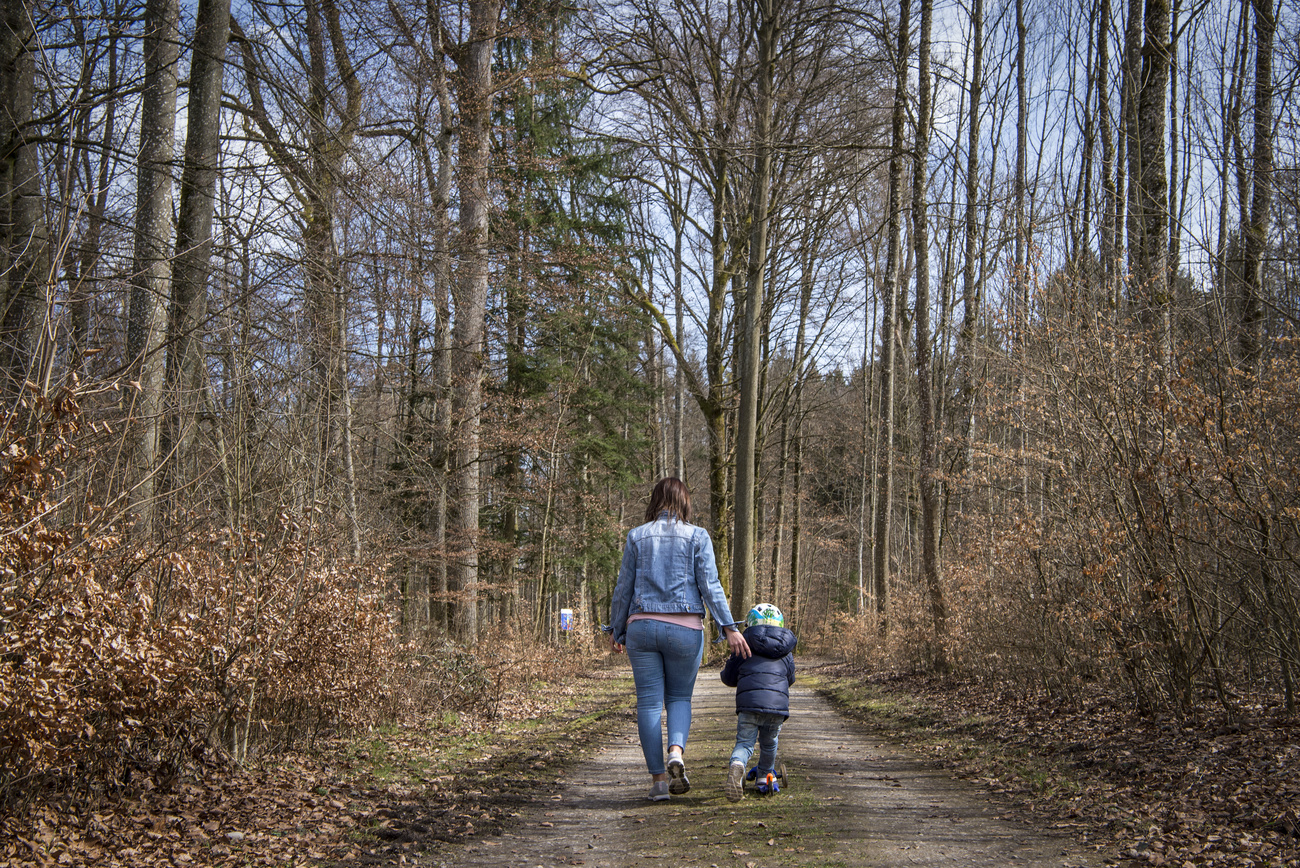
Bern council, Switzerland’s third-largest forest owner, owns Könizbergwald. In response to criticism of its forestry policy, the council obtained the backing of the supervisory authority of the canton of Bern. It presented a report at the beginning of May, certifying that the tree felling was lawful in view of the challenges posed by climate change.
Winter storms, drought and the bark beetle were taking a toll on the forest, said the experts. Major intervention was therefore necessary, legitimate and even environmentally far-sighted.

More
Switzerland’s forests of the future
The advisable approach was to plant new species of tree that could cope with rising temperatures better than spruce forests, which are prone to the heat.
Conflicts of interest
The controversy surrounding Könizbergwald is a local example of the growing pressure on all forests in Switzerland’s densely populated central Plateau region. Switzerland’s national ban on deforestation, applicable since 1876 and probably the most radical and effective environmental law the country has ever seen, acts as a safeguard against dwindling forests. But not against conflicts of interest.
Bern council owns other recreational forests near the city, where it has made space for bike trails, wood chip trails, and child day-care facilities. However, it has also closed off certain areas of forest, leaving dead wood on the ground to enhance biodiversity. The council says it feels compelled to step up its communication efforts and explain to people about the very different ways in which society relies on forested areas – this on top of the fact that the use of wood as a native building material and energy source is also gaining greater importance.
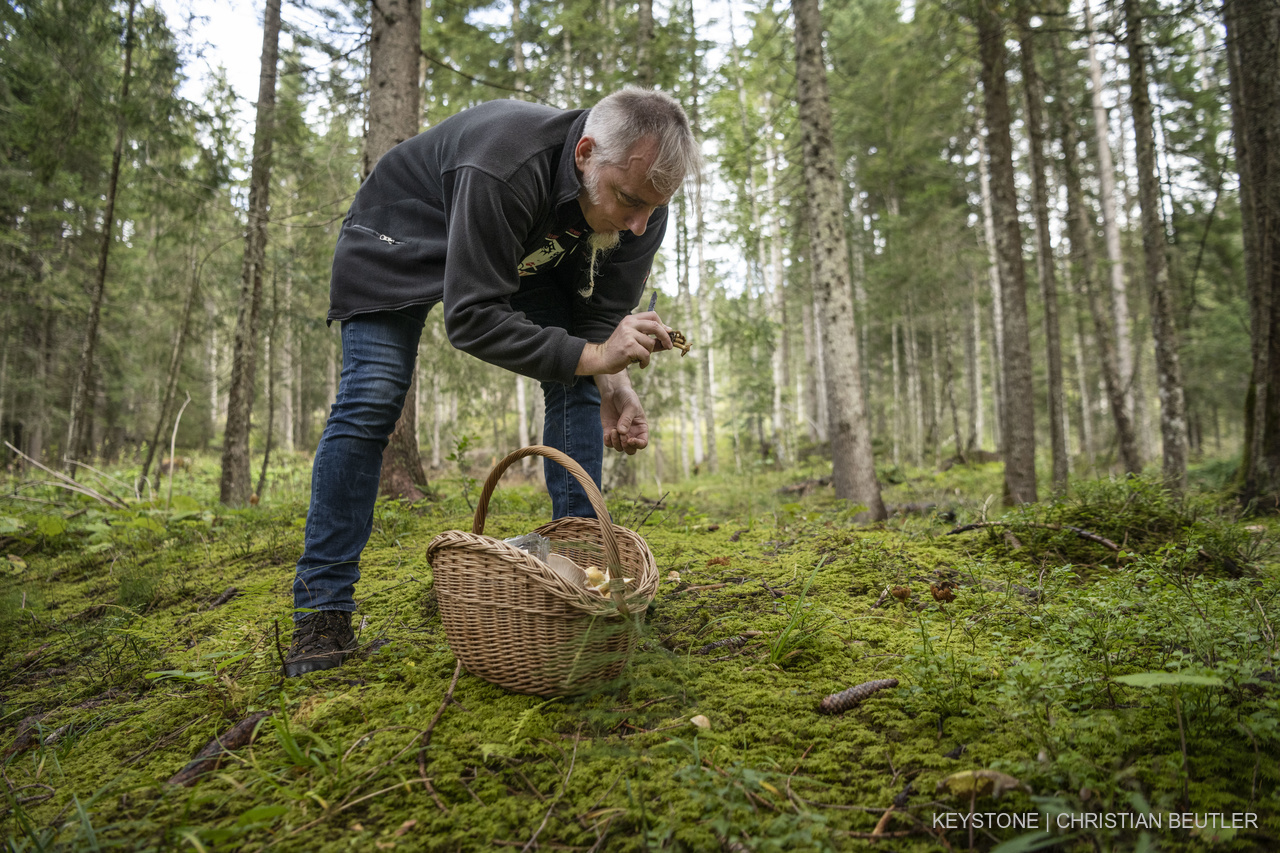
More people than ever are heading to the woods – and want more from their forests than ever. Expectations, and satisfaction levels, are shifting. We want to move freely in the forest. We want to take a deep breath and switch off in the forest. We want to observe the animals in the forest. But we also want to play paintball, visit rope parks, go orienteering, grill sausages on an open fire, and sleep under the trees. Some people want peace and quiet. Others want to let off steam. Often in close vicinity.
A place to escape
In the WSL survey, which was conducted before the pandemic, the proportion of forest visitors who said they were never bothered by anything during their visits to the woods was much lower than it was ten years ago. Satisfaction with forest recreation remains high and people return from the experience feeling refreshed. Nevertheless, things like litter, speeding bikers, and outdoor partying are detracting from people’s enjoyment.
Covid restrictions during the pandemic probably increased the potential for friction. People were suddenly frequenting parts of forests where you used to be able to feel alone in the world. Teenagers would seek out the remotest corners, set up their loudspeakers and make merry all night long. It was as if the forest were the only place for people to escape the crisis for a while. In an interview with the Tages-Anzeiger newspaper shortly after Russia invaded Ukraine, Swiss survival coach Gian Saluz summed it up perfectly, saying that he would retreat to the forest if the worst ever came to the worst, because this is where people can survive best in extreme situations.
Solitude
The forest is like a friend who is always there – someone you can rely on when the going gets tough, an unflappable presence providing refuge from the pressures of life and work. Many people told the WSL survey that they visited the forest because they wanted to get away and spend time alone, close to nature. Far away from civilisation.
South of the capital Bern there is one such place: a deep, woody ravine situated only 12 kilometres from parliament, running underneath the road that takes you to the village of Schwarzenburg. When the Rhône glacier retreated 20,000 years ago, the meltwater carved into the soft sandstone to create a winding gorge. This untamed waterway is called Schwarzwasser (black water) on account of the dark trees all around.
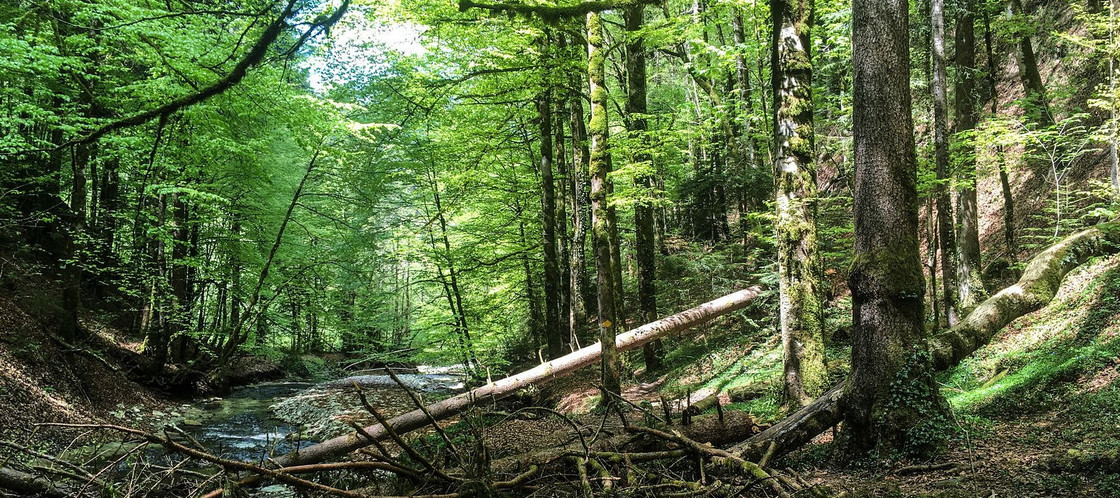
Further upstream, the valley’s wooded flanks seem to close in on either side, rising up improbably steep banks. The sky above is a mere dot, while the terrain below is a twisting, turning law unto itself, constantly fluctuating from corner to corner. Patches of mud slither to the bottom after heavy rainfall, taking vegetation and everything else with them. Uprooted, decaying trees protrude in various directions, like macabre skeletons. Sometimes a fox or a few chamois or deer can be spotted stealing through the detritus. You very rarely see other people.
It is a wild and wonderful forest, as reliable as your best friend. The outside world is far away, yet also so near.
This article was first published by Swiss ReviewExternal link.
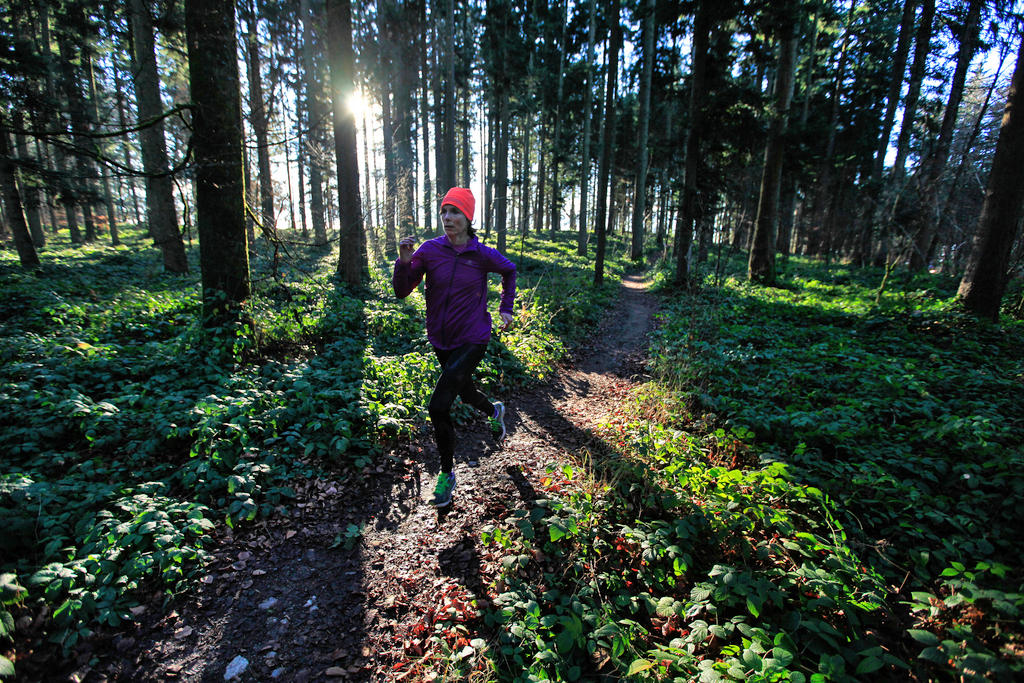
More
Swiss forests in a race against time

In compliance with the JTI standards
More: SWI swissinfo.ch certified by the Journalism Trust Initiative


























You can find an overview of ongoing debates with our journalists here . Please join us!
If you want to start a conversation about a topic raised in this article or want to report factual errors, email us at english@swissinfo.ch.